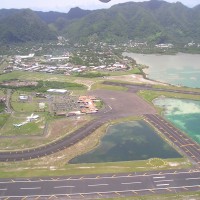
The Federal Aviation Administration has denied a request from Governor Lolo Moliga to waive the performance bond requirement for rehabilitation of the tarmac at Pago Pago International Airport.
On July 18, Governor Lolo wrote to Lead Program Manager of the Federal Aviation Administration in Honolulu, Mr Gordon Wong seeking a waiver.
He said that with the recent approval of the release of $11 million in Airport Improvement Program, funding rehabilitation of the tarmac is scheduled to be bid out soon.
Therefore he was requesting the FAA to consider using other forms of performance guarantees such as surety, insurance, or retention in lieu of a performance bond as prescribed in the Miller Act,.
The Miller Act requires prime contractors on some government construction contracts to post bonds guaranteeing both the performance of their contractual duties and the payment of their subcontractors and material suppliers.
The governor thanked the FAA official for accepting the form of performance guarantee adopted for the construction of the new Jet A fuel Tank Farm.
He said, “It is our hope that the same sensitivity which prompted this consideration will be applied to the tarmac project.”
The governor goes on to say that he was trying to maximize the multiplier effect of each federal dollar entering the territory to bolster American Samoa’s economic growth.
Lolo wrote, “This desired policy has remained elusive because locally owned construction companies lack the financial wherewithal to secure circular 570 performance bond.
“Consequently,” he says, “two foreign owned companied from New Zealand and Australia have dominated the local construction market thus perpetuating significant financial and economic leakage for the territory.”
The governor goes onto say, “Recognizing the plight of the local construction companies, these two bonded foreign companies have at several occasions inflated their bids beyond the engineers’ estimate given the hostage environment created by the inability of local companies to obtain performance bonds.
“This request mirrors the Build America, Buy America, and Hire America economic policy that is being articulated to make America Great Again.”
Lolo said the request is not intended to circumvent the basic intent of the Miller Act as it not our intention to sacrifice or compromise the quality of the project or ensuring that the project is fully completed
“We have great confidence in the ability of some of our construction companies to perform quality work based on the long list of completed and accepted public and private projects. Utilization of local construction companies ensures maximum employment of local residents contributing to the optimization of the multiplier effect. This is not true for the two foreign companies.
The Governor concluded that the American Samoa Government will do everything possible and appropriate to support our local construction companies.
FAA Program Manager Ronson Fox in an August 21st reply to the governor’s request said “unfortunately we will have to deny this request due to federal requirement that you referenced in the Miller Act.”
The FAA official explains the protections that traditional performance bonds provide ASG as the sponsor.
He said “federal regulations can require the sponsor to pay back funds for a project that is incomplete or does not meet the scope of work defined in the original grant agreement signed between the FAA and the American Samoa Government.
Performance bonds remove added liability from ASG and help to insure the contractor has the financial capability and a qualified paver for the runaway rehabilitation work to complete the project at hand. “
And he added “Quality pavement rehabilitation of the runway is critical to the operations and safety of the airport. Poor pavement construction could result in unscheduled runway closures.
Fox also informed the governor that airport runways are only eligible under Airport Improvement Program funding for rehabilitation projects at a minimum interval of 10 years.



